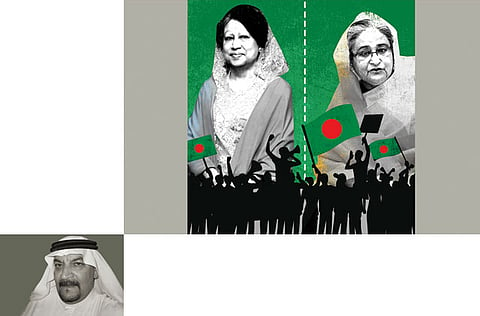Bangladesh: A battle for national identity
Governments beset by challenges often spring divisive laws on their people

There is a war of sorts on the streets of Bangladesh. And it is mostly one involving supporters of two principal figures in Bangladesh politics; the strong-willed Shaikh Hasina and the equally stubborn Khalida Zia. Their political differences have polarised the country along party lines.
From what an outsider can fathom, the Hasina government is trying to pursue a course of secular democracy. In the process, it is also demanding strict punishment, including the death penalty, for those nationals deemed traitors during the Bangladeshi war of liberation.
Three suspected collaborators have so far been convicted and two of them were sentenced to death. In protests over the trials between the government and opposition forces, over 100 people have been killed since January this year.
Khalida’s supporters on the other hand see this as a witch-hunt against any opposition figure brave enough to criticise the government’s policies. They demand that the government cease its unrelenting crackdown on religious figures and parties. Her party is also seen as giving moral support to opposition figures who have mustered enough force on the streets to bring the capital to a standstill.
Perhaps that is painting a very broad picture on the canvas. But opposing forces are making demands that have often led to bloody confrontation and death. One such force that the government accuses Khalida and her party of discreetly fostering is the Hefajat-e Islam party.
A week ago, thousands of its supporters blocked highways and clashed with police, bringing the capital city Dhaka to a standstill as they demanded an anti-blasphemy law that would carry the death penalty. Ten people were killed and hundreds injured in the violence.
This is the latest in a series of demonstrations led by the Hefajat-e Islam party, which mobilised an estimated 200,000 supporters on to the streets of the capital. Rioting erupted after police tried to block protesters from gathering in front of the country’s largest mosque. The protesters were streaming into Dhaka from remote villages, and when news of the confrontation broke out, trouble spread.
The police denied any wrongdoing, insisting that only rubber bullets were used to disperse the protesters, but witnesses and media personnel present at the scene claimed that hundreds of rounds of live ammunition were fired into the crowd. In the ensuing clashes, many vehicles and storefronts were torched by the mob.
The Hefajat-e-Islam party, which had a battlecry of ‘One point, One demand: Atheists must be hanged’ during the protests, trudged along six major highways, blocking all transport between Dhaka and other cities. One leader of a group of protesters shouted: “This government does not have faith in Allah. This is an atheist government; we will not allow them to live in Bangladesh. Muslims are brothers, we must protect Islam.”
Another demanded the strict implementation of Sharia in a country were the government is seen as moving away from religious boundaries. This is not the first time that this group has demonstrated on the capital’s streets. Similar demands were made last month, including the demand for the anti-blasphemy law, which the government insists is already on the books and needs no further revision.
The Hefajat-e-Islam party has a broad list of 13 demands, which also include a ban on the free mingling of men and women and the restoration of pledges to Allah in the constitution.
Those who oppose their calls fear that such demands would mean the talibanisation of the country. Those most vocal were female workers in the garment industry, a key source of foreign exchange in the country, who fear that such laws may mean the loss of jobs.
It is a difficult call for Bangladeshis today, polarised as they are. However, if there is any consolation, one must look at other countries where Sharia is brutally implemented. The populace suffers under the manipulation of political radicalisation covertly disguised under the banner of Islam.
It has happened in Afghanistan, Nigeria and Pakistan. Sharia was usually a cover for unfettered government corruption and control. Those who dared speak out were often ostracised and imprisoned, their rights denied. Corruption and disregard for human rights flourished; the exact opposite of what Sharia intended!
Such is not the way of Islam. Muslim countries facing internal maladies often spring such laws on their people in the hope of diverting their attention from real problems. In the process, rights of citizens are crushed in the name of Islam. Immoral as it is, it has happened before and will continue.
The politicisation of our religion has become an everyday trend. Groups are quickly formed into rampaging mobs all chanting verses from the Quran. But I would venture to guess that the powers behind such mobs usually hold the virtues of Islam as the last thing on their minds.
Tariq A. Al Maeena is a Saudi socio-political commentator. He lives in Jeddah, Saudi Arabia. You can follow him at www.twitter.com/@talmaeena
Sign up for the Daily Briefing
Get the latest news and updates straight to your inbox



